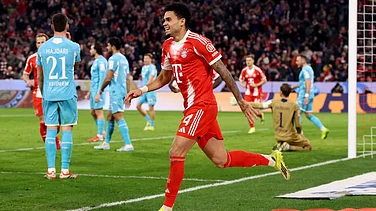WOMEN have reached the moon, they had to reach the kushti akhad a!" the girl-wrestler tells you spiritedly. Point out that 12 men but no woman has landed on the moon. Pat follows a spunkier logic: "Well, if women have managed to reach the kushti akhad a, women will soon reach the moon..."
Gumption that! Theres Girl Power aplenty at Chandgi Ram Vyayamshala in Delhis Civil Lines area these days. As ten women wrestle their way ferociously into one of the most macho arenas in a mans world, womankind is the winner already for being in the combat at all. For the freshly initiated women wrestlers, though, triumph will come only after they have fought to the finish. Allowed into the akhadas barely two years ago, they already dare to announce: "The country will gape when we bring back a gold medal for wrestling from the next Olympics. Women will teach men how to fight to win."
Oblivious to the feminist merits of the declaration, Guru Chandgi Ram nods his agreement nonetheless. Mostly because he is disgusted with male pehalwans hankering after prize money at village dangal s. Almost all the men, says the displeased guru, lack the patience to train for international competitions on the mat. "Once they learn a few techniques of kusht i, they want to wrestle in the mud for petty cash. Or else they just fight because they itch to fight and waste their energies in the process. The girls take wrestling as a serious sport. They dont fight in the mud, and dont fight needlessly. They are different."
A contrast that is apparent at the practice sessions. The very many big bulky bodies in skimpy gears are the men. The fewer, over-dressed frailer frames are the women. In fact, so heavily clothed is one of the girls that the guru screams at her for excessive modesty. "How will you fight if you kill yourself with heat! Take off that track jacket immediately," he blares his displeasure to the tittering amusement of the men around. The girl, 18-year-old Monica Dahia, hastily flings aside her jacket with near-macho aplomb. But, once the eyes are averted, she quickly tugs at her T-shirt as though to make it longer.
"Its difficult not to be aware of the reaction from men when we wrestle," says 16-year-old Sonika Kaliraman. "Especially when we are taken to villages to popularise the sport among women there. The older men are vociferous with their disapproval of girls taking to a sport so unbecoming of women, and the younger lot make lewd comments." Older sister Monica Kaliraman, 18, offers solace. Most men dont respect a woman who steps outside the kitchen anyway, so one shouldnt feel distressed whether the obscenities are flung on the streets or at the akhada s. Then, a simple advice to make the struggle smoother: "Just fight the vulgarities, do what you want, so long as parents approve." Fortunately for the two girls and their youngest sister Deepika, their parents more than approve. They are Guru Chandgi Rams daughters and, girls or not, he wouldnt let them skip even a single days practice. Hawk-eyed he looks on as the lanky lasses grapple each other for victory, their faces turning an angry red. Younger brother Hanumanta explains the violent sibling strife to the uninitiated outsider: "Actually they are the best of friends. Sonika didi went to Poland to wrestle. She brought me shoes. Theyll all go abroad if they can fight better. "
Better combating skills will liberate them in other ways too. Scholarships, job offers and overall exposure, the girls feel wrestling will give them a fighting chance to acquire them all. For someone like Monica Dahia, who lives in the conservative Samehpur area on Delhis outskirts, her "natural aggressiveness" is finally not being perceived as queer. "Now that my parents know that I am not a fighter-cock but a sportswoman who might just land a government job if she wrestles well, the taunts have stopped. My mother whod nag each time I picked up a fight has even started giving me milk and badaam (almonds) for strength," Monica giggles. Listening on, Chandgi Rams wife Omvati adds to the benefits of daughters acquiring physical skills to militate: "Theyll thrash up their husbands if the need arises."
But thanks to their new-found empowerment, the need arises less and less these days. Sonika proudly says her teacher in Ludlow Castle School cheers her strength because no male classmate finds the nerve to tease her anymore. They all know shes a Poland-returned pehalwa n. "Just the other day, someone said something nasty to me near a bus-stop. I gave him a box and felt so frustrated when other men jumped in to defend me. I would have liked to fight it out myself," spouts a breathless Sonika.
AND is there any downside to wrestling? Oh yes, say the girls in unison. They hated having their long tresses chopped off! How they enjoyed making funky plaits and pinning embellishments onto their pretty heads, they recall. But this loveable nostalgia for lost hair is quickly discarded lest guruji overhears and deems it girly mush. Not without muttering hope: "Theyll grow back."
What doesnt seem to be growing though are their biceps, observes Deepika. The svelte 14 - year-old confesses that she might measure up as a weakling if compared with the muscular women adorning the covers of foreign sports magazines. Tell her that the mass is mostly steroid-pumped and she absorbs the information. But remains unconvinced.
"Finally, these are the women who will compete with us. All those muscles will mean strength and stamina. We have to be able to fight against them." On afterthought, she adds: "Must say those women who wrestle on WWF shows on television look like men. Over-grown and ghastly. "
And yet cosmetic concerns take a backseat as the girls exercise for the vigour that will see them through victories. Slight Pushpa Sharma, daughter of a pujari at a small temple within the vyayamshalas premises, who has also taken to wrestling, throws all her weight on heftier Monica Dahia to assist the latter with her push-ups. The girls dig up mud with spades and drag heavy logs as work-out strategies thatll help them outdo women wrestlers from across the world, perhaps training at state-of-the-art gyms for the Olympics. But these girls refuse to be perceived as the underdogs: "Strength comes from the mind, not from machines. Indian girls are the strongest, they have to go through so much more. Well win."
Who would dare debate these bold and beautiful girls? For the akhada is theirs already. So is the world. And the moon? Soon, they insist.


























